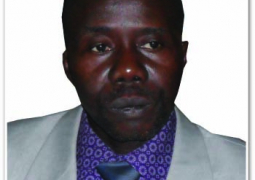In response to an invitation from the Government of the Republic of The Gambia and of the Independent Electoral Commission (IEC), H.E. Jean Ping, the Chairperson of the African Union Commission appointed and sent an Observer Mission to The Gambia in order to observe the Presidential elections that took place on 24 November, 2011.
The African Union (AU) Observer Mission is led by Dr. Fonkam Samuel Azu’u, Chairman of Elections Cameroon, (ELECAM), the Independent Electoral Commission of the Republic of Cameroon. Other Members of the Mission include Pan African Parliamentarians, Experts from Electoral Management Bodies (EMBs) and Leaders of Civil Society Organizations (CSOs) from the following African countries:
Benin;
Cameroon;
Kenya;
Mauritania;
Niger;
Swaziland; and
Uganda.
The African Union Mission observed the 24 November Presidential Elections within the spirit and letter of the Durban Declaration on the Principles Governing Democratic Elections in Africa, as adopted by the Assembly of the African Union in July 2002. The presence of this Observer Mission constitutes an unequivocal commitment of the African Union to contribute to the promotion and strengthening of democracy and the rule of law on our Continent.
The main objective of the Mission was to make an honest, independent and impartial observation and assessment of the organization and conduct of these elections.
In accordance with the African Union Guidelines for Election Observation and Monitoring, the Mission met and consulted with various Stakeholders involved in the electoral process. These included Representatives of Gambian Political Parties, the Independent Electoral Commission (IEC), the Leaders of the National Council on Civic Education (NCCE), Local and International Media, as well as an International Observer Mission from the Commonwealth and a Team of Experts from European Union (EU).
More particularly, Members of the AU Observer Mission attended on 22 November, 2011 a briefing organized by the IEC for International Observers during which they were updated on the constitutional and legal framework governing the election in The Gambia and the level of preparedness of the IEC and the security situation in the country ahead of the polls.
The African Union Mission deployed teams to various locations throughout the country. A total of five (5) teams were dispatched to the following Regions:
A )Banjul;
b) Greater Banjul area;
c) Kombo North;
d) Kombo South,
e) Kombo Central;
f) Kombo East;
g) Western Division; and
h) North Bank Division.
The different Teams carried out further consultations with relevant Stakeholders in their areas of deployment and were able to observe the concluding stages of the election campaign, while identifying polling stations where they observed the voting and the counting.
In the light of these consultations and observations, the African Union Observer Mission to the Presidential Elections in the Republic of The Gambia, notes that: the electoral process was generally peaceful and held in accordance with the Constitution and the electoral law of the Republic of The Gambia; the campaign, was on the whole conducted peacefully as all candidates carried out their political rallies across the country in line with their financial and material capability; there were no significant acts of violence reported in the run up to the elections; although provision was made for equal access of all Political Parties and candidates to the public Media, the actual coverage was strongly weighted in favor of the candidate of the ruling party; the gross imbalance in the financial and material capability of the candidates may have resulted in the lack of adequate visibility of the United Democratic Party (UDP) and the Independent Candidates.
THE VOTING AND COUNTING PROCESSES
The African Union Mission observed the following on the voting day: most polling stations were located in public institutions, especially schools and health centres. A few were, however, found in police barracks and market squares; most polling stations opened on time; polling Officials were in place and on time for the opening of the polling stations; agents of the candidates were present in the polling stations, notably from the Alliance for Patriotic Re-Orientation and Construction (APRC) and the United Democratic Party (UDP);
polling materials were delivered in good time and generally in sufficient quantities; the indelible ink which was used in all polling stations was of good quality; in general, the polling staff handled the voting process in an efficient and transparent manner; the voting process was generally orderly and peaceful; there were no overt acts of intimidation or coercion during the voting;
there was a discreet but effective presence of the military; the police presence in all the polling stations was effective and generally discreet; women and youth were well represented as electoral officials; persons with disabilities, the elderly as well as pregnant and nursing mothers were given preferential treatment, and where necessary, assisted to vote; Domestic Observers, particularly from the Civil Society Organizations Coalition on Elections (CSOCE), and the Commonwealth Youth Parliament were present in most polling stations; at the close of the voting, the procedures for securing and transferring the ballot drums were conducted transparently; the availability of polling booths and the positioning of the polling drums adequately ensured the secrecy of the vote; voters’ lists with the photographs of the voters made for easier identification; issuance of voters’ lists to representatives of candidates made the process inclusive and more transparent.
Notwithstanding the aforementioned, the AU Observer mission noted the following shortcomings: voters’ lists were not posted in polling stations; within polling centres, polling stations were not always clearly identified by the IEC; there was a prolonged delay in the transfer of the ballot drums from polling stations to the counting centres.
RECOMMENDATIONS
Based on observations and findings made by its different teams, the African Union Election Observer Mission to the 24 November 2011 Presidential Elections in the Republic of The Gambia would like to recommend the following: the Independent Electoral Commission (IEC) should undertake to post the lists of voters in their respective polling stations before the polling day and also ensure that polling stations within polling centres are adequately identified; the IEC should also establish mechanisms that allow for the counting and tallying of votes to be conducted in the respective polling stations immediately following the closure of voting; these results should then be announced and displayed at the respective polling stations; the Government and all Stakeholders should consider to revisit the Law on the public financing of Political Parties and the use of public resources to insure a level playing field for all political competitors.
CONCLUSION
In view of the aforementioned the AU Observer Mission would like to declare that the Presidential elections in the Republic of The Gambia were conducted in accordance with the Durban Declaration on the Principles Governing Democratic Elections in Africa, as adopted by the Assembly of the African Union in July 2002.
The AU Observer Mission consequently wishes to declare that the 24th November, 2011 Presidential Elections in the Republic of The Gambia were conducted in such a way that the results are a true reflection of the will of the sovereign people of The Gambia.
The African Union Mission wishes to acclaim and congratulate the people of the Republic of The Gambia, Political Parties and the three Candidates for their political maturity, as well as the IEC, the Security Agencies and all the Stakeholders involved in the current electoral process, for the peaceful conduct of the 24 November 2011 Presidential Elections and the massive turnout of voters, and urges the candidates and their supporters to accept the outcome of the elections to be announced by the IEC.



